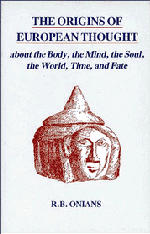Book contents
- Frontmatter
- Contents
- Preface to the first edition
- Preface to the second edition
- Introduction: The Earliest Greeks
- PART I THE MIND AND THE BODY
- PART II THE IMMORTAL SOUL AND THE BODY
- Chapter I The ψυχή
- Chapter II The Genius, Numen, etc.
- Chapter III Anima and Animus
- Chapter IV The Knees
- Chapter V The Strength
- Chapter VI The Stuff of Life
- Chapter VII River-Worship and some Forms of the Life-substance
- Chapter VIII The World: Beginnings of Greek ‘Philosophy’
- Chapter IX Death and Cremation
- Chapter X The Offerings to the Dead and to the Gods
- Chapter XI Nectar and Ambrosia
- PART III FATE AND TIME
- ADDENDA
- Indexes
Chapter VI - The Stuff of Life
Published online by Cambridge University Press: 06 August 2010
- Frontmatter
- Contents
- Preface to the first edition
- Preface to the second edition
- Introduction: The Earliest Greeks
- PART I THE MIND AND THE BODY
- PART II THE IMMORTAL SOUL AND THE BODY
- Chapter I The ψυχή
- Chapter II The Genius, Numen, etc.
- Chapter III Anima and Animus
- Chapter IV The Knees
- Chapter V The Strength
- Chapter VI The Stuff of Life
- Chapter VII River-Worship and some Forms of the Life-substance
- Chapter VIII The World: Beginnings of Greek ‘Philosophy’
- Chapter IX Death and Cremation
- Chapter X The Offerings to the Dead and to the Gods
- Chapter XI Nectar and Ambrosia
- PART III FATE AND TIME
- ADDENDA
- Indexes
Summary
Let us now look at the word αἰών (aiōn, whence ‘æon’), which is associated with ψυχή. On the assumption that its nearest cognates are ἀεί and aevum it is generally agreed that the fundamental meaning for Homer and later is ‘period of existence’ and so, from the meaning ‘lifetime’, that of ‘life’ is derived. But the passages, from which this is inferred for Homer, can be put thus: ‘If I go home, my αἰών will exist for a long time’ (ἐπὶ δηρὸν…ἔσσεται. Homer elsewhere uses εῖναι for ‘to live, survive’) and ‘Briefly-lasting was (μινυνθάδιος ἔπλετο) his αἰών for him vanquished beneath the spear of Aias’. Here the time is expressed by the other words. Usually the person himself is described as μινυνθάδιος. And elsewhere in Homer αἰών clearly is not a period of time but a ‘thing’ of some kind like ψυχή persisting through time, life itself or a vital substance necessary to living. At death ‘ψυχή and αἰών leave’ a man, or we are told merely that ‘αἰών leaves’ him or that he ‘is deprived’ of it or of it and ψυχή. ‘I fear’, says Achilles, ‘lest meanwhile flies enter into the stalwart son of Menoitios by the bronze-dealt wounds and breed worms therein and defile his body—for the αἰών is slain therefrom—and so it should rot in all its flesh.’
- Type
- Chapter
- Information
- The Origins of European ThoughtAbout the Body, the Mind, the Soul, the World, Time and Fate, pp. 200 - 228Publisher: Cambridge University PressPrint publication year: 1988



